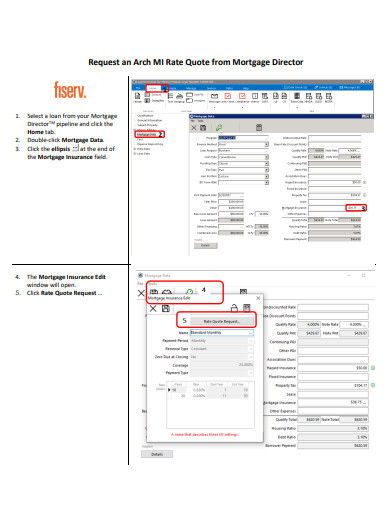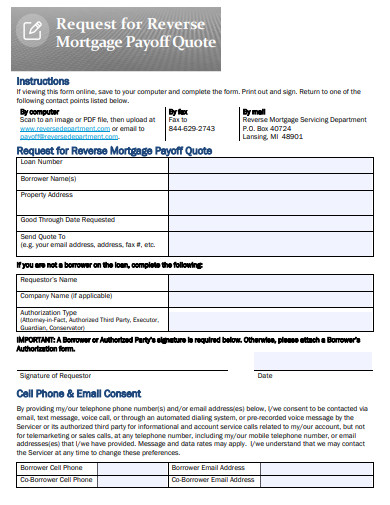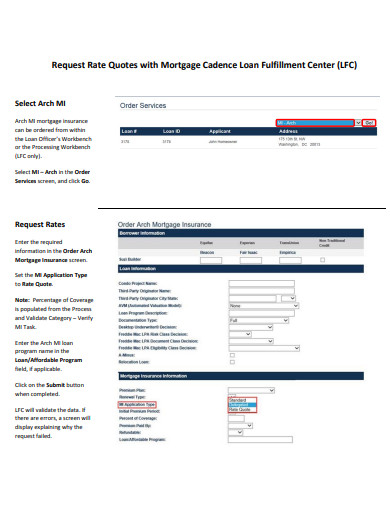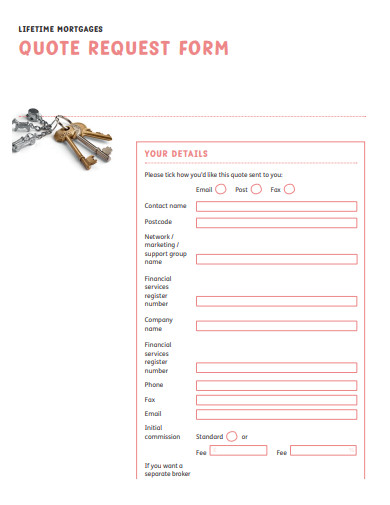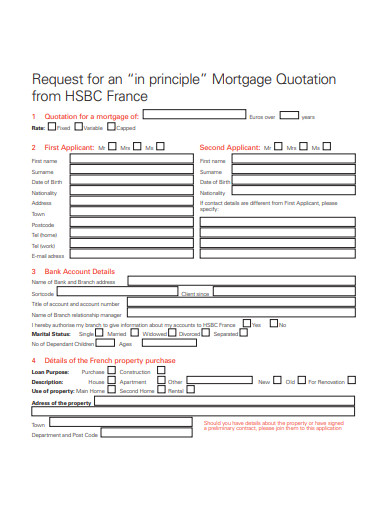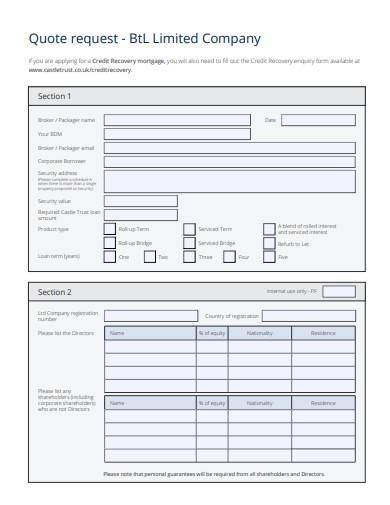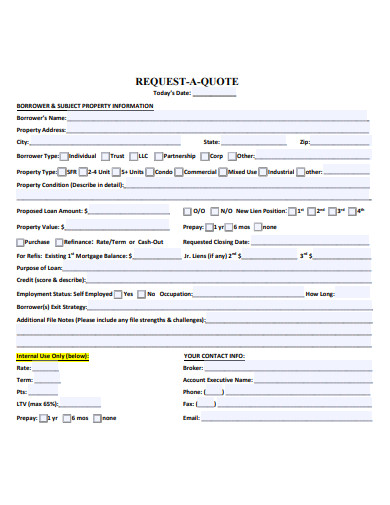A mortgage is a loan that is used to buy or manage a home, land, or other sort of property investment. The borrower offers to pay the lender over time, usually in a series of successive installments split evenly between principal and interest. The property is used as security for the loan. A borrower must apply for a loan with their selected lender and meet a number of criteria, including minimum credit scores and prepayments. Before they reach the closing stage, mortgage applications go through a thorough underwriting process. Standard and fixed-rate loans are two types of mortgages that differ depending on the borrower’s demands.
6+ Mortgage Quote Request Samples
A request for quotation (RFQ), also referred as an invitation for bid (IFB), is a method in which a firm invites qualified suppliers and contractors to provide pricing information and bids for the opportunity to complete specific tasks or projects. Businesses that want a continuous supply of a particular set of reference products should use the RFQ method. RFQs can be sent before or after a request for proposal (RFP). The initial step in sending a request for proposal is usually an RFQ (RFP). These two documents are similar in that they both include information about the project or services needed, however RFQs typically request a more detailed price quote.
1. Mortgage Quote Request
2. Sample Mortgage Quote Request
3. Simple Mortgage Quote Request
4. Mortgage Quote Request Example
5. Professional Mortgage Quote Request
6. Company Mortgage Quote Request
7. Printable Mortgage Quote Request
The difference between RFQ and RFP
The distinction between an RFQ and an RFP is the purpose of each statement. When you use an RFQ, you’re probably seeking for the best deal. A request for proposal (RFP), on the contrary, asks sophisticated questions in order to select the best vendor based on a variety of parameters.
As a result, concerns in an RFQ are nearly entirely focused on cost. Cost per unit, bulk discounts, pricing plans, and service conditions are all common queries in a request for quotation. Additionally, they frequently include pricing tables to aid with vendor evaluations.
RFP questions, on the other hand, frequently delve into more complex topics like expertise, customer support, competitive points of difference, and so on. While pricing is frequently addressed in RFPs, it is usually just one of many various assessment criteria.
How Mortgage Works
Mortgages allow individuals and corporations to acquire rental properties without paying the whole acquisition price up front. The borrower pays back the loan interest payments over a set period of time until they acquire the property outright. Claims over estate or claims on property are other terms for mortgages. If the borrower defaults on the loan, the lender has the option to seize on the estate. A residential homeowner, for example, promises their home to their lender, who then has a lien on it. This protects the lender’s ownership interest if the buyer defaults on their payments. In a foreclosure, the lender may expel the occupants, sell the land, and apply the proceeds to the mortgage debt.
When a buyer and seller have reached an understanding of the terms of their transaction, they or their agents will meet for a settlement. That’s when the borrower pays the lender a deposit. The seller will give the buyer control of the property and obtain the approved amount of money, and the purchaser will sign any pending mortgage agreements.
FAQs
When to use a request for quotation?
An RFQ, while incredibly useful, isn’t appropriate for every procurement situation. An RFQ is most commonly used for indirect purchase because cost is the key factor. You may use an RFQ to order specific items like hardware, office supplies, or materials, for example. Additionally, they can be used for indirect procurement. When utilized to source complex goods and services, though, it’s critical to know all the specifics.
What is an open bid?
Responses from all qualifying vendors are displayed in an open bid. During the submission time, the buyer opens bids, allowing vendors to compare pricing. Suppliers have until the bid deadline to change and update their submitted proposals.
RFQs aren’t meant to be made public. The soliciting corporation does not need to compile lengthy purchase requisitions because it just sends RFQs to businesses it trusts. In addition, unlike a public appeal, a corporation can just receive the number of bids it sought, saving time.
Related Posts
Student Research Proposal
Diet Plan
Housekeeping Resume
Marriage Proposal Letter
Nursing Resume
Fund Transfer Letter
Purchase Order Cancellation Letter
Certificate of Service
Employee Leave Form
Visitors Log
Requisition Form
Student Feedback Form
Payment Receipt Format
Formal Interview Letter
Reflective Writing

